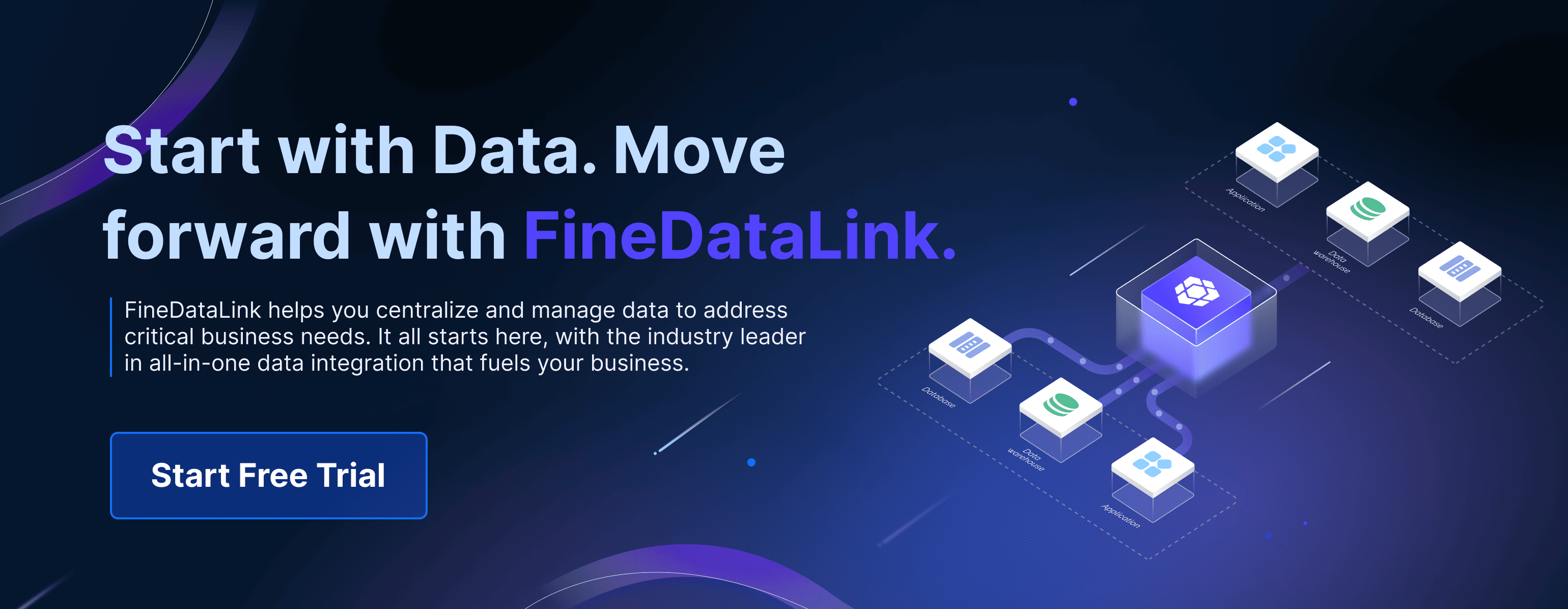

A data point is a single piece of information that forms the foundation of data analysis. You can think of it as the smallest unit of information that can be analyzed. Understanding data points is crucial because they help identify patterns and trends in various fields, such as customer behavior and market trends. Tools like FineDataLink, FineReport, and FineBI utilize data points to empower businesses. By analyzing these points, you can make informed decisions, optimize processes, and gain insights that drive growth and innovation.
What is a Data Point?
Basic Definition of Data Point
A data point is the smallest unit of information you can analyze. Imagine it as a single dot on a graph in your high school math class. Each dot represents a specific value or characteristic within a larger dataset. Alone, a data point might seem insignificant, but when combined with others, it reveals patterns and trends.
Simple Analogies
Think of data points like atoms of information. Just as atoms form molecules, data points come together to create a comprehensive picture. For instance, consider each data point as a single puzzle piece. Individually, a piece doesn't show much, but when you assemble them, you see the complete image. This analogy highlights how crucial each data point is in forming a bigger understanding.
Everyday Examples
In everyday life, you encounter data points more often than you realize. When you track your daily steps with a fitness app, each step counts as a data point. Similarly, every transaction you make at a store becomes a data point in your spending history. These examples show how data points help you learn about yourself and your habits.
Types of Data Points
Data points come in different types, each serving a unique purpose in analysis.
Quantitative Data
Quantitative data points are numerical. They measure quantities and allow you to perform mathematical calculations. Examples include your height, weight, or the number of books you read in a year. These data points help you quantify aspects of your life and make comparisons.
Qualitative Data
Qualitative data points, on the other hand, describe qualities or characteristics. They are non-numerical and often involve categories or labels. For instance, your favorite color, the type of cuisine you prefer, or the brand of your smartphone are qualitative data points. These help you understand preferences and trends that aren't easily measured with numbers.
Role of Data Point in Data Analytics
Importance in Analysis
Data points play a crucial role in data analytics. They serve as the building blocks for generating insights. By examining these individual pieces of information, you can uncover patterns and trends that might otherwise remain hidden. For instance, when analyzing customer behavior, each transaction or interaction becomes a data point. These points help you understand what drives customer decisions and preferences.
Generating Insights
Data points allow you to generate valuable insights. Imagine you run a retail store. By analyzing sales data points, you can identify which products sell best during certain times of the year. This insight helps you stock inventory more effectively, ensuring you meet customer demand without overstocking.
Supporting Decision-Making
Data points support decision-making by providing a factual basis for your choices. When you rely on data, you reduce guesswork and increase the likelihood of making informed decisions. For example, a company might use data points from customer feedback to improve its products. This approach ensures that changes align with customer needs and expectations.
Data Points in Business Intelligence
In business intelligence, data points are indispensable. They form the foundation for data-driven strategies that enhance business operations. By leveraging data points, you can transform raw data into actionable insights that drive growth and efficiency.
Data-Driven Strategies
Data-Driven Strategies: Businesses use data points to develop strategies that are grounded in reality. For example, marketing teams analyze data points from campaigns to determine what resonates with their audience. This analysis leads to more effective marketing strategies that boost engagement and conversion rates.
Case Study: Marketing Analytics Case Studies demonstrate the power of using specialized tools to transform business decisions. By focusing on data-driven marketing, companies achieve impactful results, showcasing the success of informed strategies.
Enhancing Business Operations
Data points enhance business operations by identifying areas for improvement. When you analyze operational data, you can pinpoint inefficiencies and streamline processes. For instance, a company might use data points from production lines to reduce waste and improve quality control.
Case Study: Real-World Product Analytics Case Studies highlight how companies like AB Tasty leverage product analytics to drive growth. By identifying friction points, they improved product tour completion rates by 40%, illustrating the importance of data in enhancing user experience and operational efficiency.
Data Point in FanRuan's Products
FanRuan offers a suite of products that leverage data points to enhance business intelligence and analytics. These products—FineReport, FineBI, and FineDataLink—provide powerful tools for data integration, visualization, and analysis.
FineReport
FineReport is a robust reporting and dashboard software designed to create dynamic and pixel-perfect reports. It excels in two main areas:
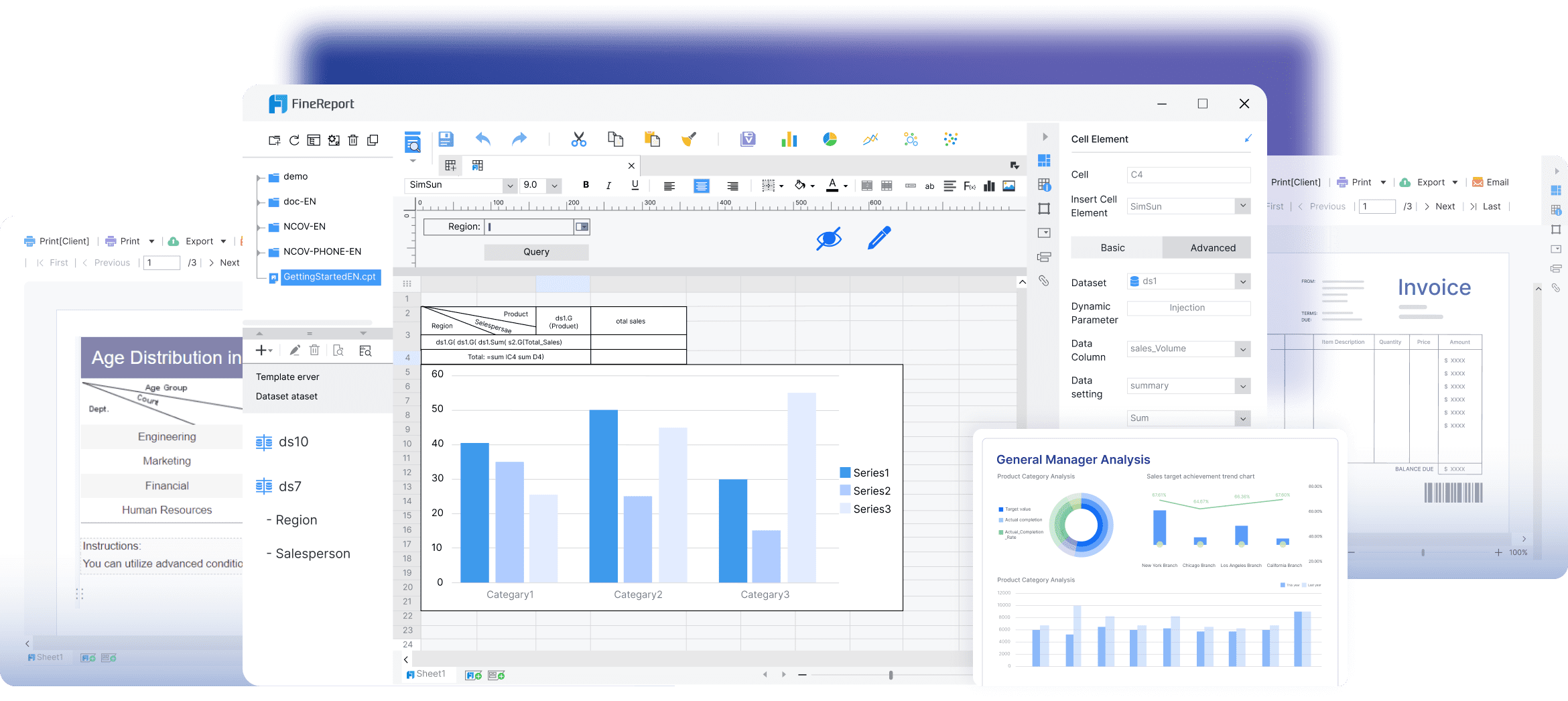
Report Creation
With FineReport, you can effortlessly create detailed reports. The software's intuitive drag-and-drop interface allows you to design reports that meet your specific needs. You can connect to various data sources, ensuring that your reports are comprehensive and up-to-date. This capability makes FineReport an essential tool for businesses that require precise and timely reporting.
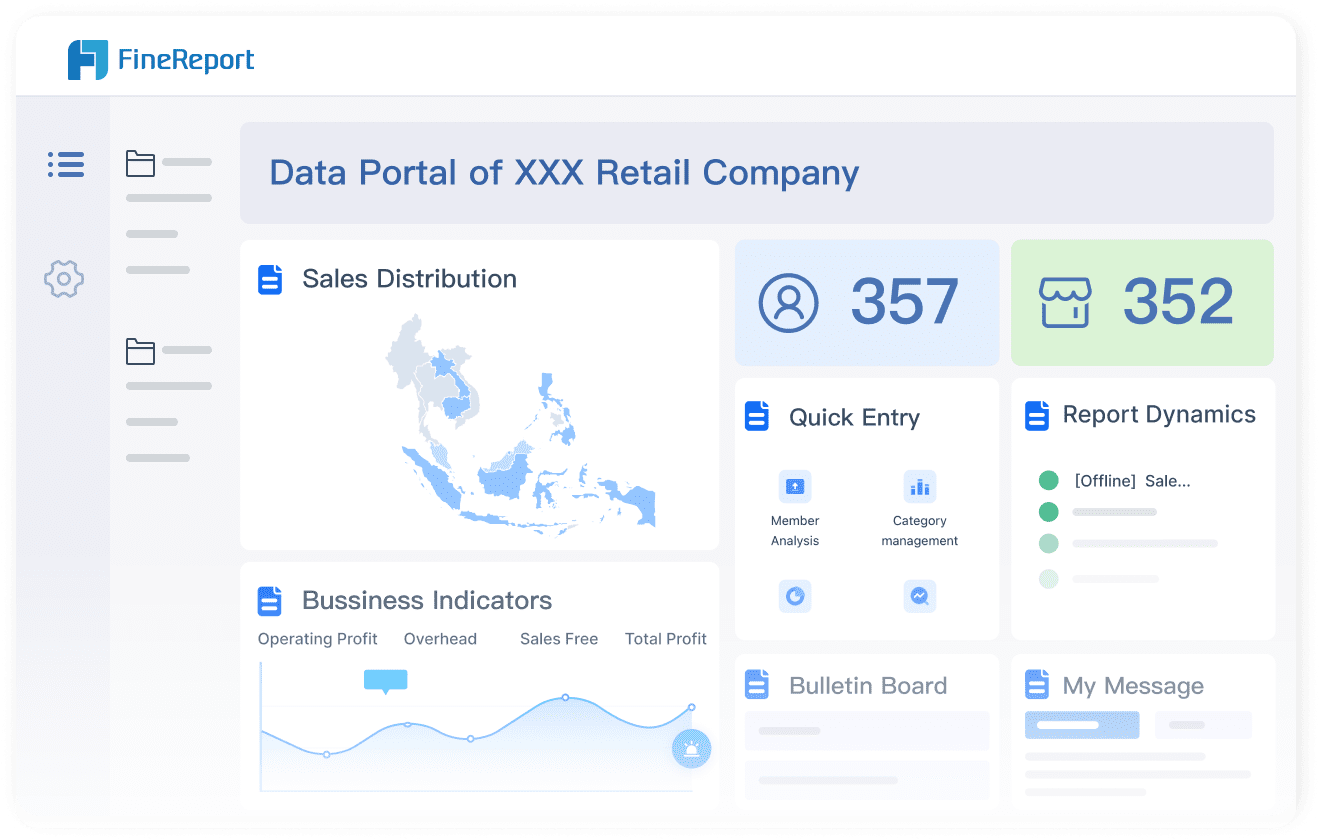
Data Visualization
FineReport also shines in data visualization. It offers a wide range of chart types and styles, enabling you to present data in a visually appealing manner. By transforming raw data points into insightful visualizations, you can uncover trends and patterns that might otherwise go unnoticed. This feature helps you make informed decisions based on clear and concise data presentations.
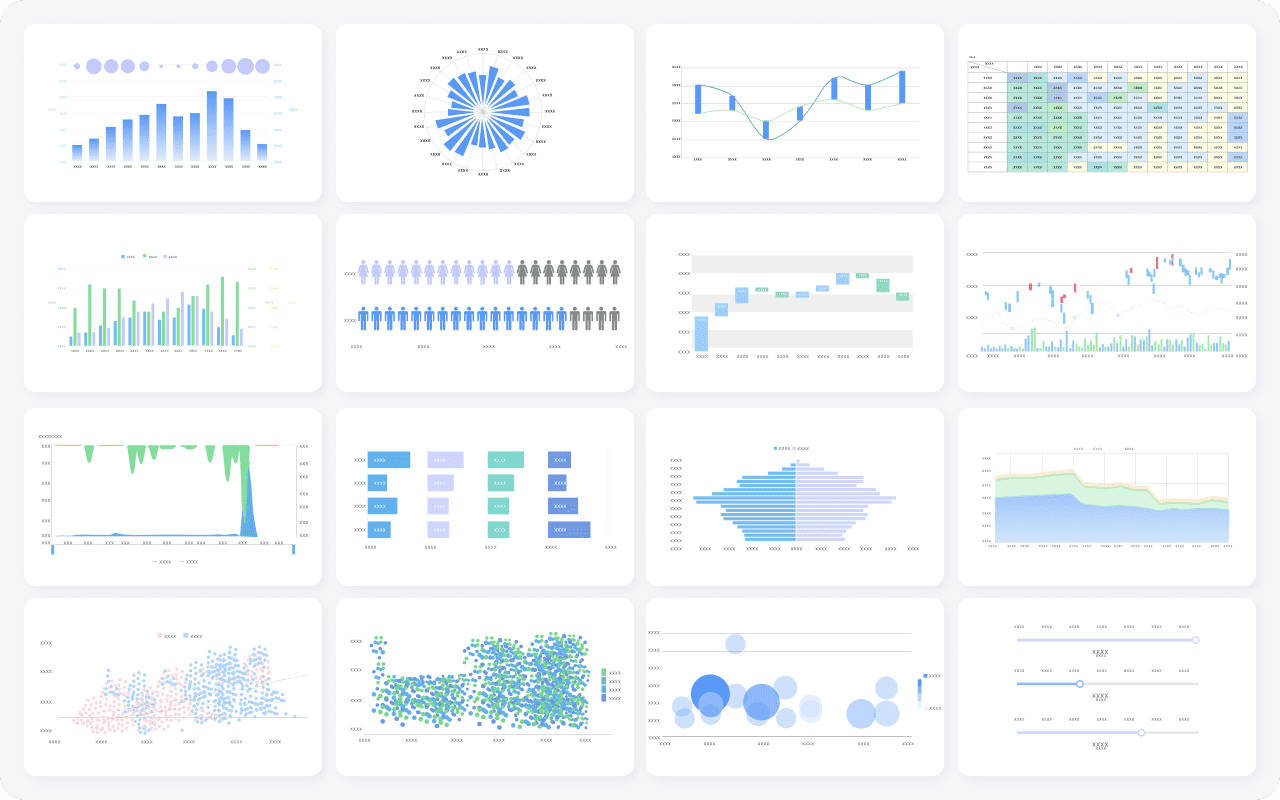
FineBI
FineBI is a self-service business intelligence software that empowers users to analyze and share data across the organization. It focuses on two key aspects:
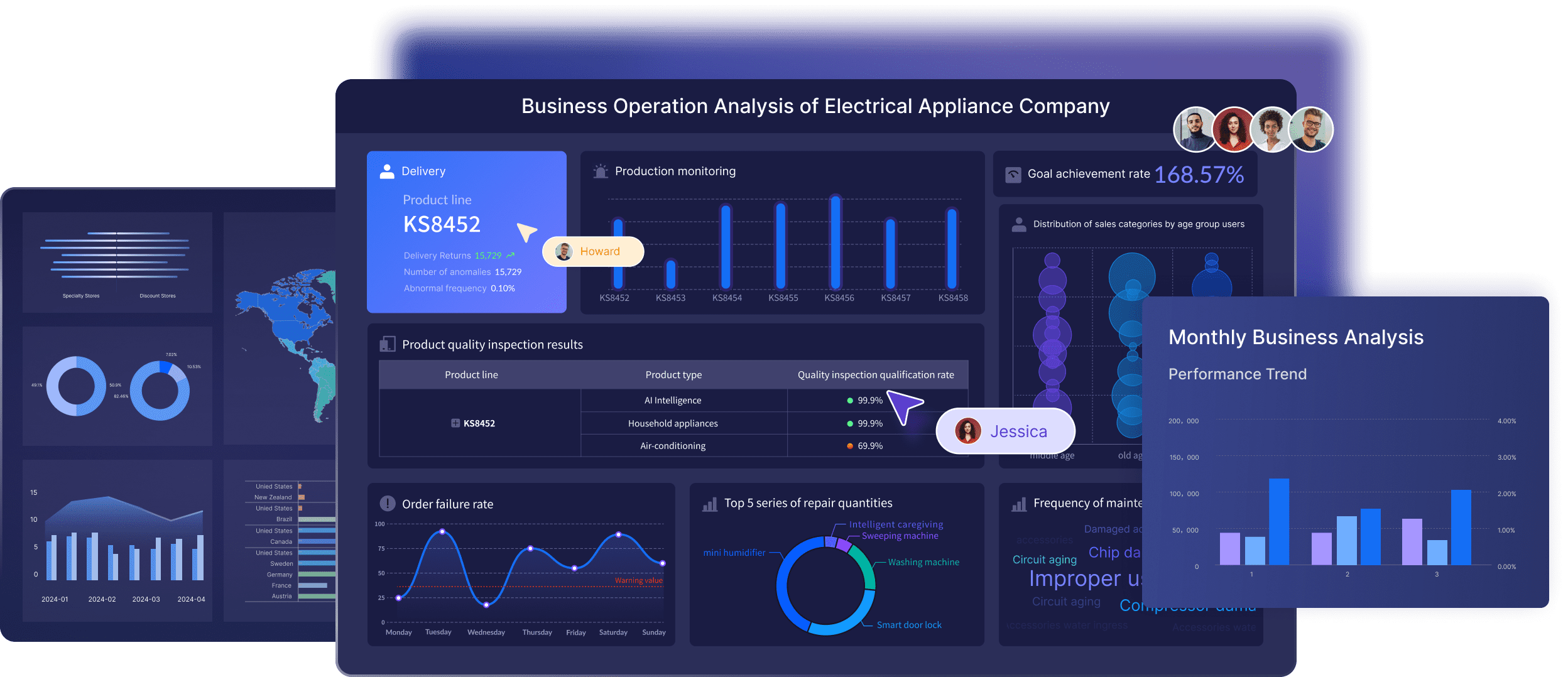
Advanced Analytics
FineBI provides advanced analytics capabilities that allow you to delve deep into your data. Its high-performance computing engine processes large datasets efficiently, enabling you to perform complex analyses with ease. By leveraging these capabilities, you can gain valuable insights into your business operations and make data-driven decisions.
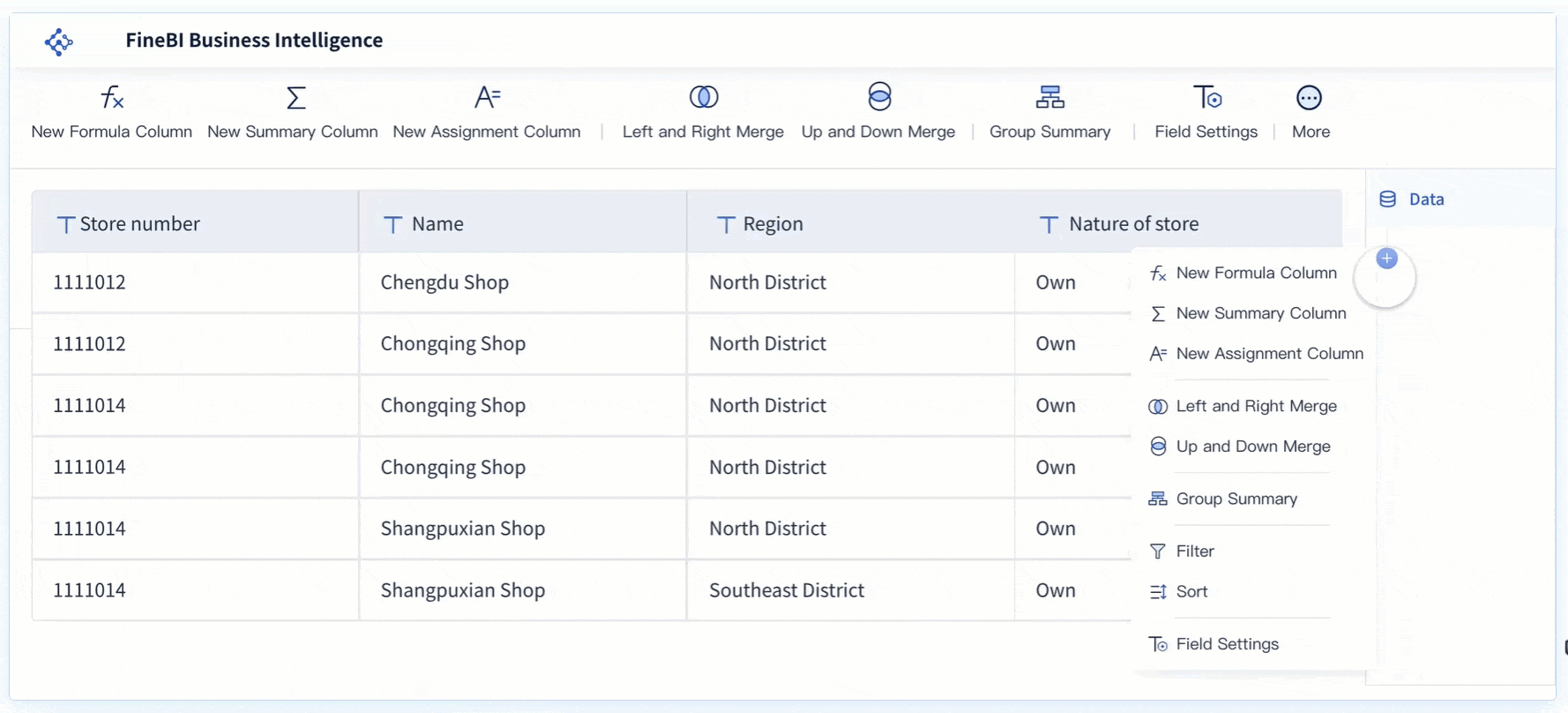
The interactive dashboards in FineBI offer a user-friendly way to explore data. You can create dashboards that display real-time data, allowing you to monitor key performance indicators and track trends as they happen. This interactivity ensures that you have the most current information at your fingertips, facilitating quick and informed decision-making.
FineDataLink
FineDataLink is an enterprise-level data integration platform that simplifies complex data tasks. It focuses on two primary functions:
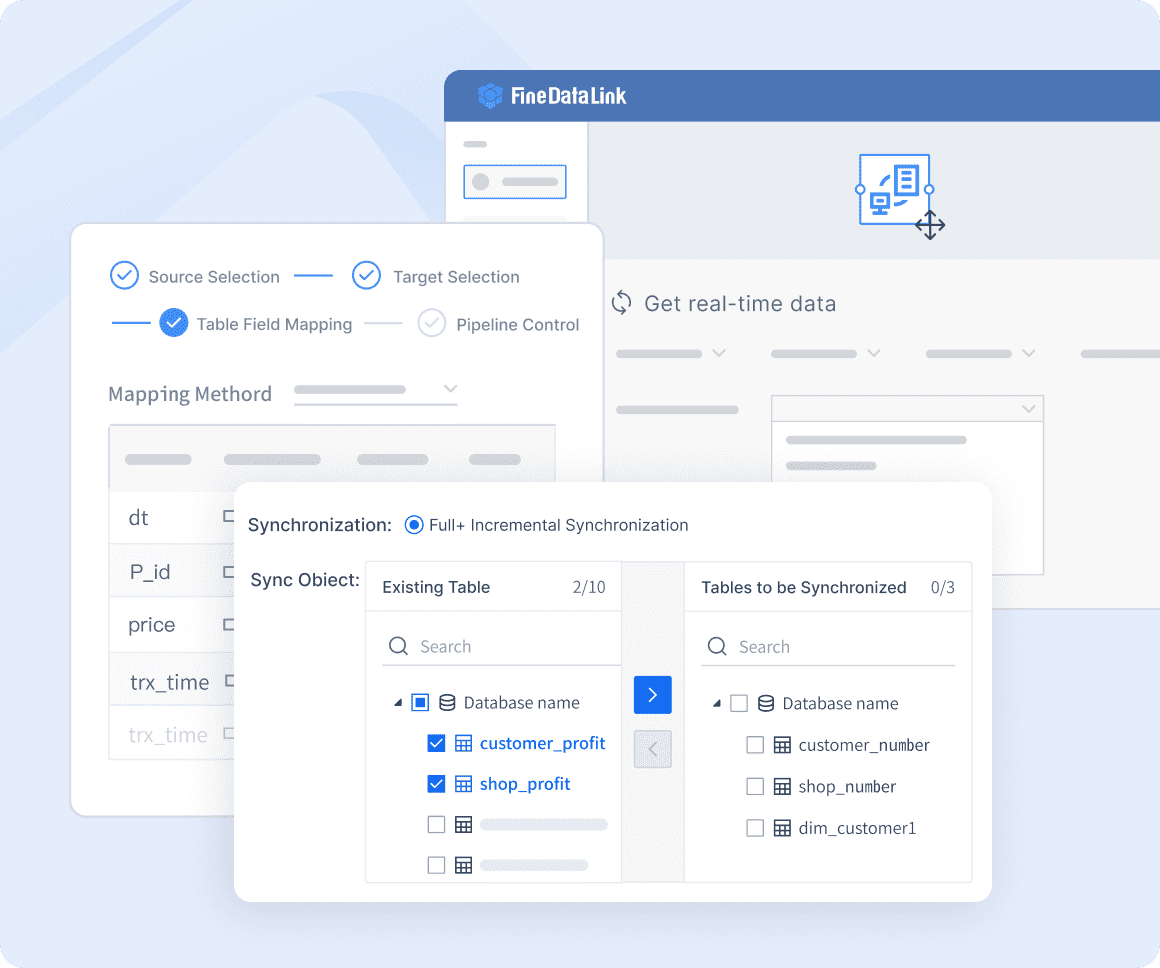
Data Integration
FineDataLink excels in data integration, providing seamless connectivity between various data sources. Its low-code platform allows you to integrate data without extensive coding knowledge. This feature streamlines the process of combining data from different systems, ensuring that you have a unified view of your business information.
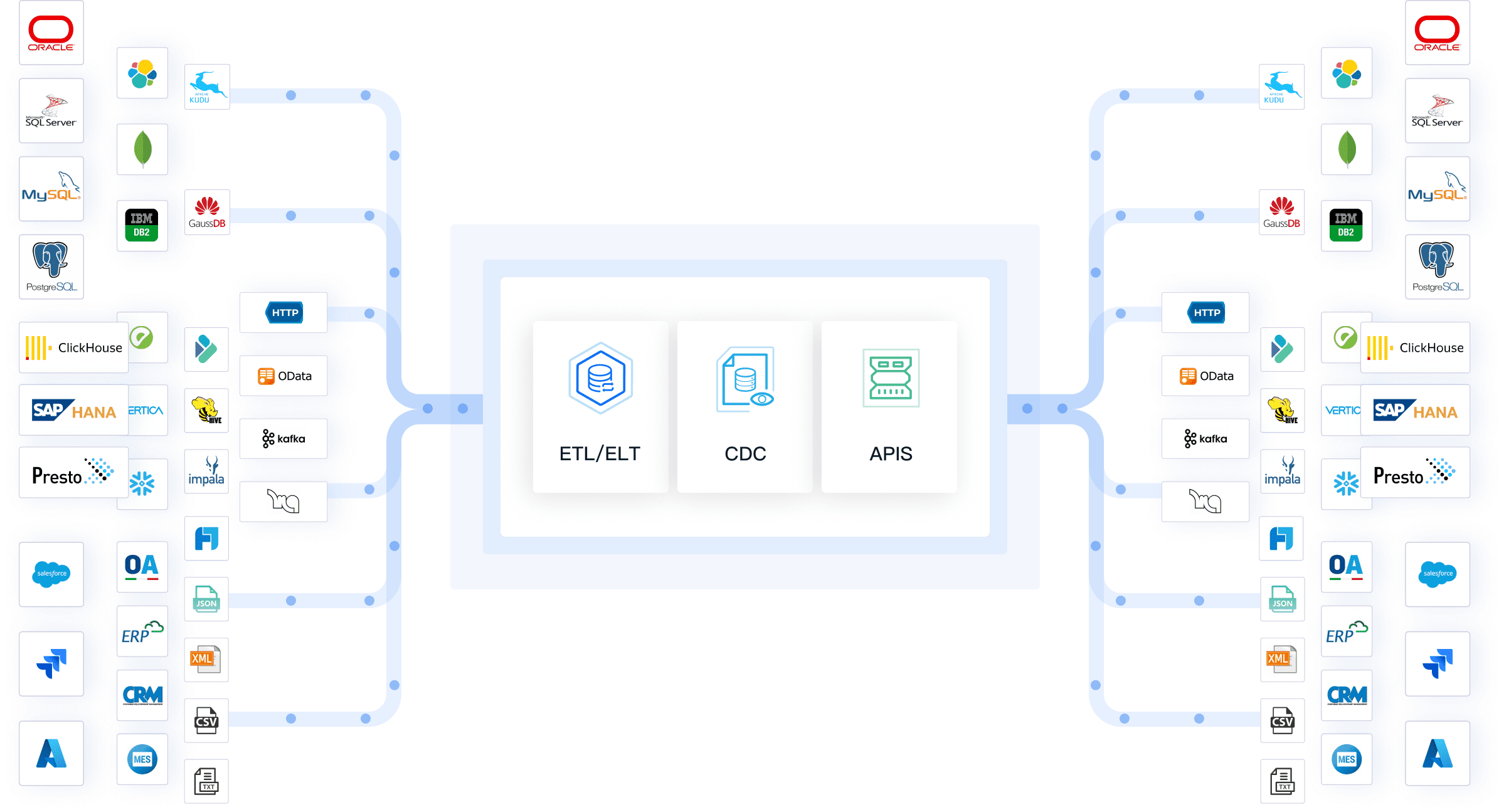
Seamless Connectivity
With FineDataLink, you achieve seamless connectivity across your data landscape. The platform supports real-time data synchronization, ensuring that your data is always up-to-date. This capability is crucial for businesses that rely on timely data to drive their operations and make strategic decisions.
By utilizing FineReport, FineBI, and FineDataLink, you can harness the power of data points to enhance your business intelligence and analytics efforts. These tools provide the foundation for data-driven strategies that drive growth and efficiency.
Challenges with Data Point
Data Silos
Data silos present a significant challenge when dealing with data points. They occur when data gets stored in isolated systems or departments, making it difficult for you to access and integrate information from different sources.
Fragmented Data
Fragmented data results from data silos. When your data resides in separate locations, it becomes challenging to get a complete picture of your business operations. This fragmentation can lead to inefficiencies and missed opportunities. You might find it difficult to identify patterns or trends because the data points are scattered across various systems.
Lack of Integration
A lack of integration compounds the issue of data silos. Without seamless connectivity between systems, you struggle to combine data points into a unified dataset. This lack of integration hinders your ability to perform comprehensive analyses and make informed decisions. You need integrated data to ensure that your insights are accurate and actionable.
Complex Data Formats
Complex data formats pose another challenge in working with data points. Different systems and applications often use varied formats, making it difficult for you to standardize and simplify data structures.
Data Standardization
Data standardization involves converting diverse data formats into a consistent structure. Without standardization, you face difficulties in comparing and analyzing data points. You need to ensure that your data follows a uniform format to facilitate accurate analysis and reporting.
Simplifying Data Structures
Simplifying data structures is crucial for effective data analysis. Complex data formats can slow down your processes and increase the risk of errors. By simplifying these structures, you make it easier to work with data points and extract valuable insights. Streamlined data structures enhance your ability to perform real-time analytics and support decision-making.
"Data synchronization challenges include maintaining real-time synchronization, scalability issues, security risks, and performance limitations."
Addressing these challenges requires a strategic approach. You must focus on integrating data sources, standardizing formats, and simplifying structures to overcome the obstacles posed by data silos and complex data formats. By doing so, you can unlock the full potential of your data points and drive informed decision-making.
Overcoming Data Point Challenges with FanRuan
Solutions Offered
FanRuan provides innovative solutions to tackle the challenges associated with data points. By leveraging their advanced technology, you can streamline your data processes and enhance your business intelligence efforts.
Unified Data Platforms
FanRuan offers unified data platforms that integrate various data sources into a single, cohesive system. This integration eliminates data silos, allowing you to access and analyze information seamlessly. With a unified platform, you gain a comprehensive view of your business operations, enabling you to make informed decisions based on complete and accurate data.
FanRuan's products feature user-friendly interfaces designed to simplify complex data tasks. These interfaces allow you to interact with data intuitively, reducing the learning curve and increasing productivity. By providing easy-to-use tools, FanRuan empowers you to focus on analysis and insights rather than struggling with technical complexities.
Benefits of FanRuan's Approach
FanRuan's approach to overcoming data point challenges offers several key benefits that enhance your data management and analysis capabilities.
With FanRuan's solutions, you experience improved data accessibility. The unified platforms ensure that you can access data from multiple sources without barriers. This accessibility allows you to retrieve and analyze data quickly, supporting timely decision-making and strategic planning.
Enhanced Data Quality
FanRuan's approach also enhances data quality. By standardizing data formats and simplifying structures, you ensure that your data is accurate and reliable. High-quality data leads to more precise analyses and insights, enabling you to make decisions with confidence. This focus on data quality helps you optimize your operations and drive business growth.
By adopting FanRuan's solutions, you can effectively overcome the challenges associated with data points. These tools provide the foundation for a robust data strategy that supports your business objectives and enhances your competitive edge.
Impact of Real-time Data Synchronization in Data Point

Importance of Timely Data
In today's fast-paced world, having timely data is crucial for making informed decisions. Real-time data synchronization plays a vital role in ensuring that you have access to the most current information.
Up-to-date Information
Real-time data synchronization keeps your information current. It ensures that data across all your applications remains consistent and accurate. This eliminates the need for manual data entry and reduces the risk of outdated information. When your data is up-to-date, you can trust the insights you derive from it.
"Real-time data synchronization ensures consistent and accurate data across apps, reducing the need for manual data entry and avoiding outdated information."
Quick Decision-Making
With real-time data, you can make decisions quickly. You don't have to wait for data updates or worry about inaccuracies. This immediacy allows you to respond promptly to changes in your business environment. Quick decision-making can give you a competitive edge, enabling you to seize opportunities as they arise.
Real-time Capabilities in FanRuan
FanRuan's products offer robust real-time capabilities that enhance your data management processes. These features ensure that your data remains synchronized and accessible whenever you need it.
Instant Data Updates
FanRuan provides instant data updates, allowing you to access the latest information without delay. This capability ensures that your data reflects real-time changes, giving you a clear and accurate picture of your business operations. With instant updates, you can rely on your data to make timely and informed decisions.
Continuous Data Flow
Continuous data flow is another key feature of FanRuan's real-time capabilities. This ensures that your data moves seamlessly between systems, maintaining a steady stream of information. Continuous flow reduces redundancy and enhances system performance, providing you with reliable data for analysis and decision-making.
"Data synchronization enhances system performance by reducing redundancy and ensuring timely availability of accurate data. It also improves decision-making processes and analytics reliability."
By leveraging FanRuan's real-time capabilities, you can optimize your data management and improve your business processes. These tools provide the foundation for a data-driven strategy that supports your growth and success.
Practical Applications of Data Point

Data points play a crucial role in various real-world applications. They help you understand complex systems, make informed decisions, and identify trends. Let's explore some practical examples and business scenarios where data points prove invaluable.
Real-world Examples
Case Study 1
In the realm of technology, data points enable the development of intelligent systems. Consider a smart thermostat that adjusts the temperature based on your preferences. Each temperature reading and user interaction serves as a data point. By analyzing these points, the system learns your habits and optimizes energy usage, enhancing comfort and efficiency.
Case Study 2
In astronomy, scientists use data points to understand celestial bodies. For instance, they track the brightness of stars over time. Each observation becomes a data point on a graph. By studying these points, astronomers identify patterns and anomalies, leading to discoveries about star behavior and the universe's expansion.
Business Scenarios
Industry-specific Applications
In finance, data points track market trends and guide investment decisions. Each stock price, trading volume, and economic indicator forms a data point. By analyzing these points, you can predict market movements and make strategic investments. This approach helps financial analysts and investors minimize risks and maximize returns.
Cross-industry Benefits
Data points offer cross-industry benefits by aiding in decision-making processes. In healthcare, for example, patient data points like heart rate and blood pressure help monitor health conditions. Doctors use these points to diagnose illnesses and tailor treatments. Similarly, in retail, customer purchase data points reveal buying patterns, enabling businesses to optimize inventory and marketing strategies.
"Data points in technology aid in decision-making processes, monitoring system performance, and identifying patterns, trends, and anomalies."
By understanding and utilizing data points, you can unlock valuable insights across various fields. Whether in technology, finance, healthcare, or retail, data points empower you to make informed decisions and drive innovation.
Understanding data points is essential for grasping the bigger picture in any field. These small units of information reveal patterns and trends that drive informed decisions. As DataPoints Team highlights, data points are crucial for understanding broader topics, such as financial attitudes and beliefs. FanRuan plays a pivotal role in optimizing data usage. Their solutions, like FineReport, FineBI, and FineDataLink, empower you to harness data effectively. Explore FanRuan's offerings to enhance your data-driven strategies and unlock new insights for growth and innovation.
FAQ
A data point is a single piece of information or observation. It represents a specific value or characteristic within a larger dataset. Think of it as a single dot on a graph, which, when combined with others, reveals patterns and trends.
Data points form the foundation of data analysis. They help you identify patterns, trends, and insights. For example, in finance, each stock price or trading volume acts as a data point. By analyzing these, you can predict market movements and make strategic investments.
Data points are individual pieces of information. Data, on the other hand, refers to a collection of these points. Imagine data points as atoms and data as molecules formed by these atoms.
Certainly! When you track your daily steps with a fitness app, each step counts as a data point. Similarly, every transaction you make at a store becomes a data point in your spending history.
Data points can be quantitative or qualitative. Quantitative data points are numerical, like your height or weight. Qualitative data points describe qualities or characteristics, such as your favorite color or preferred cuisine.
Data points provide a factual basis for decisions. By analyzing them, you reduce guesswork and increase the likelihood of making informed choices. For instance, companies use customer feedback data points to improve products, ensuring changes align with customer needs.
Challenges include data silos and complex data formats. Data silos occur when data is stored in isolated systems, making integration difficult. Complex formats require standardization for accurate analysis.
FanRuan's products, like FineReport, FineBI, and FineDataLink, leverage data points for data integration, visualization, and analysis. They help you create reports, perform advanced analytics, and ensure seamless data connectivity.
Continue Reading About Data Point
2025 Best Data Integration Solutions and Selection Guide
Explore top data integration solutions for 2025, enhancing data management and operational efficiency with leading platforms like Fivetran and Talend.
Howard
Dec 19, 2024
2025's Best Data Validation Tools: Top 7 Picks
Explore the top 7 data validation tools of 2025, featuring key features, benefits, user experiences, and pricing to ensure accurate and reliable data.
Howard
Aug 09, 2024
Best Data Integration Vendors for Seamless Workflows
Discover the top 20 data integration vendors of 2025 for seamless workflows. Compare tools like Talend, AWS Glue, and Fivetran to optimize your data processes.
Howard
Jan 22, 2025
Best Data Integration Platforms to Use in 2025
Explore the best data integration platforms for 2025, including cloud-based, on-premises, and hybrid solutions. Learn about key features, benefits, and top players.
Howard
Jun 20, 2024
Best Data Management Tools of 2025
Explore the best data management tools of 2025, including FineDataLink, Talend, and Snowflake. Learn about their features, pros, cons, and ideal use cases.
Howard
Aug 04, 2024
Business Data Analyst vs Business Analyst Key Differences Explained
Compare business data analyst vs business analyst roles, focusing on key differences, responsibilities, skills, and career paths to guide your career choice.
Lewis
Mar 11, 2025


